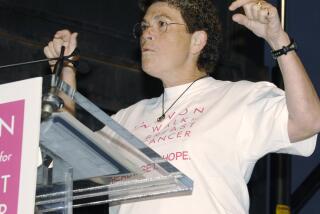Annals Teem With Bitter Lessons of Blind Faith in New Technology
- Share via
WASHINGTON — After William Halsted declared in 1889 that a radical mastectomy was the only treatment for breast cancer, the Baltimore physician’s theory went virtually unexamined for 80 years.
By 1970, long after the advent of radiation and chemotherapy, an incredible 80% of women with that disease still were having their breasts removed.
Then researchers made a stunning discovery: Mastectomy patients did no better--and sometimes fared worse--than those treated with radiation or chemotherapy. The Halsted mastectomy is now used in fewer than 5% of all breast cancer cases.
The annals of American medicine teem with bitter lessons of blind faith in some new and costly technology--a surgical procedure, a drug or a fancy piece of machinery. As experience with the Halsted mastectomy illustrates, insufficient evaluation of a technology, either before or after it is marketed, can have harmful consequences beyond driving up costs.
Some other examples of medical technologies that have fallen short of expectations:
--Heart bypass surgery. It gained broad acceptance after the advent of a temporary blood-pumping device that could take over the heart’s functions during the operation. Only after the number of bypass operations reached 250,000 annually did researchers find that, with few exceptions for certain categories of patients, there is little or no significant difference in death rates or heart attack survival rates between bypass patients and those treated with medication. Bypass surgery usually resulted in an improved quality of life, however.
--Phenobarbital. This drug each year is given to perhaps 40,000 feverish infants and young children to prevent epileptic convulsions. Researchers found just this month that it is ineffective and may inhibit intellectual performance, at least temporarily.
--The gastric balloon. This device, designed to be inflated in the stomach to reduce an obese person’s appetite for food, was tried on several thousand patients before it was shown to cause intestinal complications. It works no better than dieting.
--The intermittent positive pressure breathing device. Scientists now know that this machine, widely marketed in the 1950s to prevent post-surgery pneumonia, is ineffective and can actually cause infections.
--Carotid endarterectomy. At its peak in 1985, 107,000 Americans underwent this procedure, by which plaque buildup is removed from blood-vessel walls to prevent a stroke. A 1988 RAND Corp. study found that two-thirds of such procedures were unnecessary--and that nearly 10% of the patients died or suffered strokes as a direct result of it. A better alternative might be to take an aspirin a day, said Louis B. Hays, recent acting administrator of the U.S. Health Care Financing Administration for Medicare payment policy.




